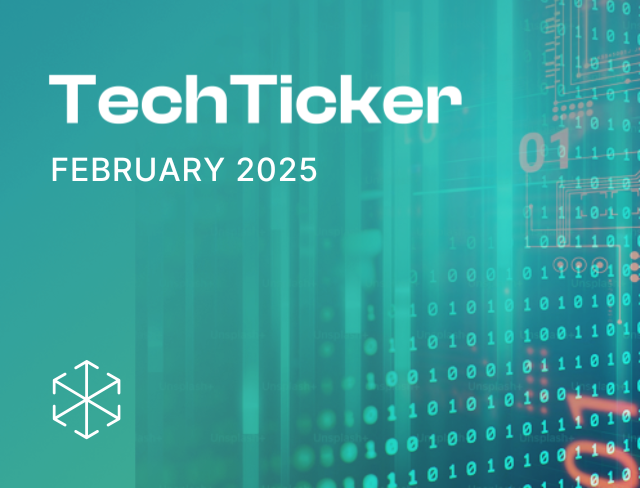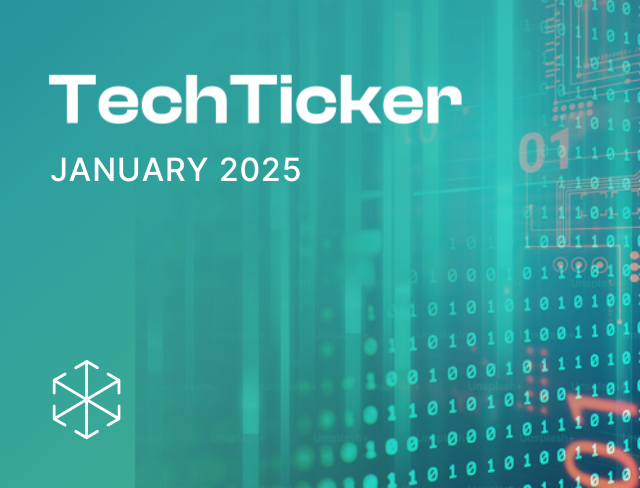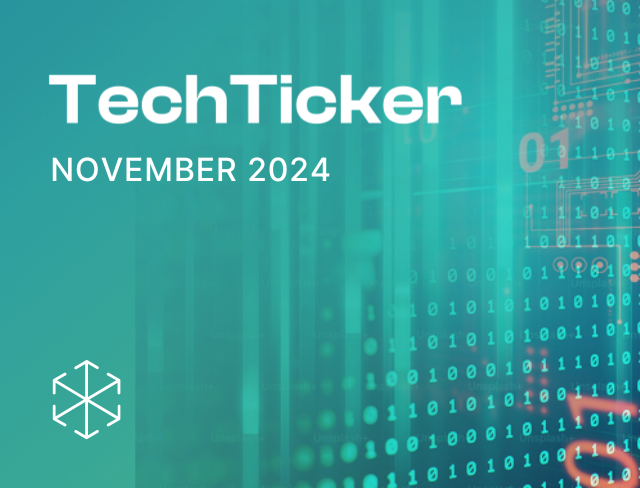“Welcome to the latest issue of our tech policy newsletter! This edition explores budget takeaways for tech, online gaming regulation, the fight against fake news, and other key topics that impact the way we interact with technology. Our aim is to provide you with concise, informative content that will help you stay up-to-date on the ever-evolving world of technology policy.” – ChatGPT
On that freakishly accurate note, let’s dive in!
Budget for tech – the Amrit Kaal version
In tandem with the previous year’s budget, the 2023-24 version too has a deep focus on technology. From data to fintech to startups to foreign investment to emerging tech – this budget has something for everyone. The finance minister’s speech also gave a special mention to India’s unique digital public infrastructure such as CoWin, UPI, and Aadhar. Read Ikigai’s top tech takeaways from the budget.
Allocation to the IT ministry: The ministry saw a 47.10% rise in allocations with INR 14,300 crores sanctioned. The Digital India Mission makes up most of IT ministry budget with INR 10,676 crores earmarked for the government’s flagship digitalisation initiative.
Data embassies enter the chat: Apart from introducing the ‘National Data Governance Policy’ to enable access to anonymized data and encourage research and innovation – the government will also set up ‘data embassies’. These embassies allow foreign countries to store data in data centers located in host countries while retaining jurisdiction over them. They are similar to a diplomatic embassy – which enjoys immunity from the host country’s laws and regulations. Countries like Estonia, Bahrain, Monaco, and Luxembourg already have such “embassies” in place. The Indian government is likely to come out with a policy to govern this. The how, what and who of these embassies are yet to be defined.
The emerging-tech push: For AI, the government has placed value on building capacities, encouraging research, and building cutting-edge applications. It will establish three AI Centers of Excellence focusing on developing scalable solutions in sectors such as agriculture, health and sustainable cities, among others. Also, 100 labs will be set up to develop 5G applications focusing on smart classrooms, precision farming, and healthcare. Meanwhile, a national digital library will provide access to content and books across geographies, languages, genres and levels.
DigiLocker and KYC: Documents available in DigiLocker will be expanded and opened to use by businesses. Now, they can easily share documents with various authorities, regulators, etc. The KYC process for the financial sector is expected to be simplified through a risk-based mechanism – instead of a one size fits all approach.
Online gaming: The government has introduced new sections to tax net winnings on gaming platforms. It has removed the TDS threshold of INR 10,000 for online gaming. This means all winnings will now be taxed at 30% at the end of the financial year with losses being offset. The government has also indicated that the GST policy for the sector will be clarified soon.
Welcome to the internet – what would you like to play…err…regulate?
On 17 January, the IT ministry held a consultation with online gaming companies, industry associations, and law/policy experts – on the online gaming amendments to the Information Technology (Intermediary Guidelines and Digital Media Ethics Code) Rules, 2021 (IT rules).
Catch up quick: Released in December 2022, the proposal seeks to establish a central framework to protect users from risks like addiction and financial loss. It introduces due diligence obligations for online gaming companies – which are defined as a new and separate class of intermediaries. It also proposes to develop a self-regulatory mechanism for the sector. Notably, all intermediaries such as social media platforms, app stores, etc. must ensure that the online game is registered with a self-regulatory body before they ‘host, publish or advertise’ them.
What happened at the consultation? At the consultation, stakeholders discussed what ‘online games’ really mean? Would a spin the wheel contest on an e-commerce platform be covered? The industry called for clarity around the who, what, and how of self-regulatory bodies. The need for a graded approach for compliances was also discussed. Meanwhile, the jury is still out on whether a stringent RBI-like KYC mechanism for online gaming makes sense. Stakeholders also sought clarity on the proposal’s conflict with state gaming laws.
Legislative intent: The minister of state IT, Mr. Rajeev Chandrasekhar shared the government’s intent to encourage self-regulation in the sector. He clarified that the proposal aims to completely rule out wagering – irrespective of whether an online game is that of skill or chance. For example, betting on a game of chess is prohibited, even if chess itself is a game of skill. Largely, the government is open to comments from stakeholders on the definition of ‘online games’ and other issues.
A consultation, extension and a few days later – attempt to censor fact check?
Right after the online gaming consultation, the IT ministry released an updated proposal to amend the IT rules. Now, the government proposes fact-checking you and wants the Press Information Bureau (PIB) to be the truth referee. Inputs on this and the gaming amendments can be shared by 20 February.
Satire news channels on YouTube, no more? According to the proposal, any content flagged by PIB or other ‘authorized authority’ as fake or false will have to be taken down by platforms like Instagram and YouTube. The government is also open to considering a self-regulatory body that’ll certify ‘trusted’ fact-checkers. However, PIB’s fact checking mechanism has been called out in the past for incorrect flagging of content. For instance, in 2020, Newslaundry listed several social media posts and news articles that PIB’s fact-checking unit had ‘debunked’ without any valid basis.
The industry view: The Editor’s Guild of India is of the view that leaving determination of fake news only at the discretion of the government will lead to censorship of the press. They have also said that the proposal will make it ‘easier to muzzle the free press’ and would give PIB limitless powers to ‘force online intermediaries’ to remove content that the government ‘may find problematic’.
In case you missed it!
- Inter-ministerial committee to study need for digital competition law: The corporate affairs ministry has reportedly set up an inter-ministerial committee for studying the need for a digital competition act. This comes on the heels of the Parliamentary Standing Committee on Finance’s report on ‘Anti-competitive practices by bigtech companies’. The committee will examine the existing legal framework, the need for ex-ante regulations, international best practices to regulate digital competition, and practices of ‘Systemically Important Digital Intermediaries’. It will be headed by the corporate affairs secretary and include other experts and government officials from various departments (e.g., IT ministry and consumer affairs department).
- Got a problem with a social media platform? The grievance redressal committee under the IT rules approved last year has been finally operationalized. The IT ministry has appointed officials to the three-tiered grievance redressal mechanism which will hear appeals against content related decisions of social media platforms. This includes officials from the IT ministry, home ministry, and information and broadcasting ministry. It also has diverse representatives from banks, the Indian Navy and L&T. However, these committees’ functioning and processes remain unclear.
- A common license? The Telecom Regulatory Authority of India (TRAI) has published a consultation paper that deals with convergence of broadcasting and telecom services owing to emerging technologies in the sector. For instance, OTT Communication apps provide services similar to fundamental telephony services but are not subject to licensing. The paper observes that once 6G comes out, satcom players could use the same infrastructure as terrestrial telecom players, without the same regulatory requirements. The paper lauds the government’s forward thinking on the subject with the Draft Indian Telecommunication Bill . With several services covered under the same umbrella, the Bill may potentially have the scope of dealing with the converged market. At the same time, the paper examines whether there is a need for a separate uniform code that provides a wholistic regulatory model to deal with convergence of technologies. While regulation is critical, TRAI notably recommends putting ease-of-doing-business at the heart of such a code, by creating an inter-governmental structure with clearly defined roles and responsibilities for each stakeholder. Inputs on the paper can be sent by 27 February 2023
- Influencer guidelines: The consumer affairs ministry released a guide for celebrities and ‘virtual influencers’ to ensure they do not mislead their audiences when endorsing products or services. Put simply, next time your favorite influencer recommends you to buy a moisturizer they received as a PR package or got paid to review – they will have to tell you in those many words. Interestingly, this comes at a time when the latest viral trend on TikTok #de-influencing, which has over 76 million views, has thrown open the debate on overconsumption caused by social media influencers.
- Where are the bills? The budget session of the parliament started from 01 February. The Competition Amendment Bill 2022 (which was recently examined and adopted by the standing committee on finance) has been listed for consideration. Other bills that might be discussed include the draft Digital Personal Data Protection Bill and the Telecommunication Bill. In addition, the Digital India Act is also in its final stages of drafting and may be released for public consultation soon. In fact, the government is planning a state tour across multiple cities to discuss it.
Before we sign off, check out our yearly electric vehicles, sustainability and Web3 policy round up.
That’s it from us. See you next month. If you enjoyed reading TechTicker, do share it.










